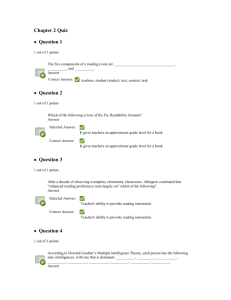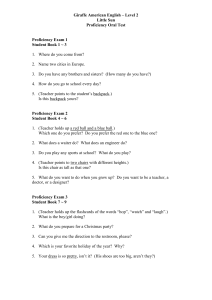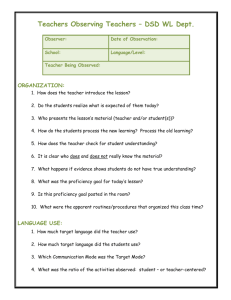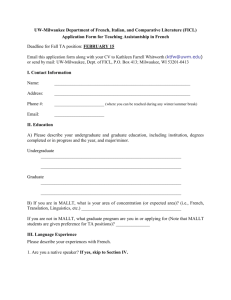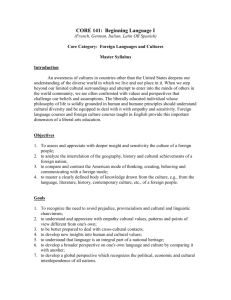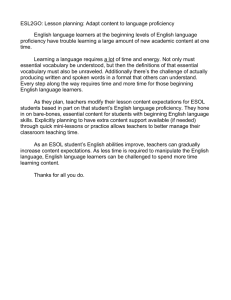Living Learning Community objectives
advertisement
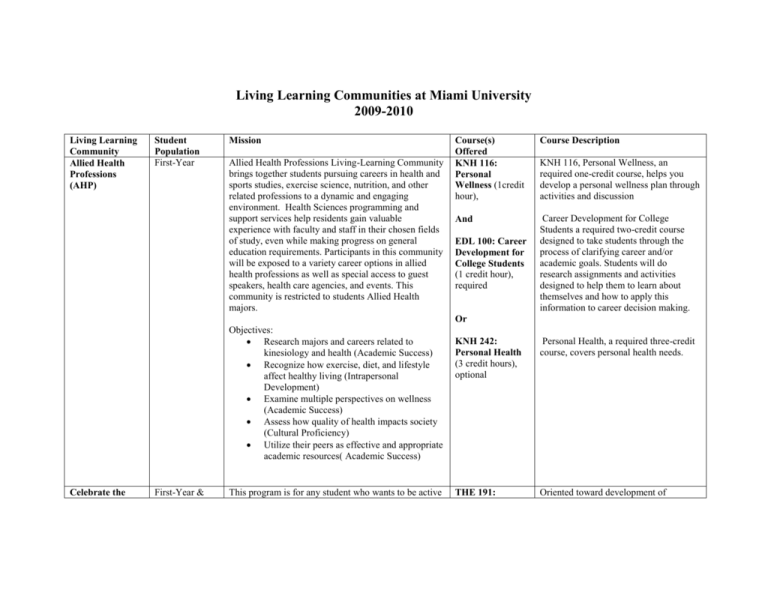
Living Learning Communities at Miami University 2009-2010 Living Learning Community Allied Health Professions (AHP) Student Population First-Year Mission Allied Health Professions Living-Learning Community brings together students pursuing careers in health and sports studies, exercise science, nutrition, and other related professions to a dynamic and engaging environment. Health Sciences programming and support services help residents gain valuable experience with faculty and staff in their chosen fields of study, even while making progress on general education requirements. Participants in this community will be exposed to a variety career options in allied health professions as well as special access to guest speakers, health care agencies, and events. This community is restricted to students Allied Health majors. Course(s) Offered KNH 116: Personal Wellness (1credit hour), Course Description And Career Development for College Students a required two-credit course designed to take students through the process of clarifying career and/or academic goals. Students will do research assignments and activities designed to help them to learn about themselves and how to apply this information to career decision making. EDL 100: Career Development for College Students (1 credit hour), required KNH 116, Personal Wellness, an required one-credit course, helps you develop a personal wellness plan through activities and discussion Or Objectives: Research majors and careers related to kinesiology and health (Academic Success) Recognize how exercise, diet, and lifestyle affect healthy living (Intrapersonal Development) Examine multiple perspectives on wellness (Academic Success) Assess how quality of health impacts society (Cultural Proficiency) Utilize their peers as effective and appropriate academic resources( Academic Success) Celebrate the First-Year & This program is for any student who wants to be active KNH 242: Personal Health (3 credit hours), optional Personal Health, a required three-credit course, covers personal health needs. THE 191: Oriented toward development of Arts (CTA) Upper-class in the visual or performing arts. Each year, students work with faculty from the School of Fine Arts to create programs that explore art, creative writing, music, theatre, architecture and dance. Objectives: Extend their knowledge of the opportunities available in the visual and performing arts (Cultural Proficiency) Recognize art as a way to explore self in relation to others (Intrapersonal Development) Develop community around visual and performing arts (Effective Community Engagement) Bridge a gap between School of Fine Arts majors and students interested in the arts (Effective Community Engagement) Become aware of the educational and entertainment values of art (Cultural Proficiency) Positively interact with the School of Fine Arts faculty, staff, and/or visiting artist (Academic Success) Explore visual and performing arts (Academic Success, Cultural Proficiency) Participate in art related activities outside of Miami University (Effective Community Engagement) Change: Emerging Community Leaders (ECL) First-Year The CHANGE program is for emerging community leaders who are dedicated to making the world a better place. This community is for students who are interested in finding their voices and taking positive Theatre Appreciation (3 credit hours), optional – Non Fine Arts Majors. awareness as an audience member. Studies theories and methods of understanding a theatrical presentation, through study of dramatic literature, production traditions, and viewing productions. BOT 131: Plants Humanity and Environment (3 credit hours), optional – Fine Arts Majors. Introduction to fundamental concepts in plant biology, ecology, and scientific perspective as they relate to issues of social concern. MUS 189: Great Ideas in Western Music ( 3 credit hours, optional) Oriented toward the development of a sequential listening skill and descriptive vocabulary used in a study of the style of Western Art Music from Middle Ages through 20th century. EDL 306: The Nature of Group Leadership (2 credit hours), The rich history of leadership will be explored through this interactive course designed to help participants develop their own leadership style. The action on Miami’s campus and beyond. Students are supported by the Office of Community Engagement and the Harry T. Wilks Leadership Institute. optional. reasoning behind specific leadership styles will be explored as well as the advantages and disadvantages of these styles. CHI 141: Chinese Community Cultural Studies (1 credit hour), required. In this course, students will focus on Chinese culture, the Chinese language, and current events. Objectives: Participants will increasingly see leadership as a shared responsibility (Effective Community Engagement) Participants will increasingly see themselves as capable and prepared for leadership (Intrapersonal Development) Participants will recognize interdependence amongst members of a group (Intrapersonal Development) Participants will recognize their role in continuously shaping the community (Effective Community Engagement) Participants will discover conviction that calls them to positive action toward making a more just world (Cultural Proficiency) Chinese Culture Community (CLF) First Year & Upperclass This program is open to students who have a strong interest in Chinese language and culture. A faculty member teaches Chinese courses, creates cultural programming, and informally advises and tutors students in the program. Objectives: Understand and acknowledge different cultural social norms (Cultural Proficiency) Gain awareness of current cultural issues and politics (Cultural Proficiency) Build upon language skills on a regular and reoccurring basis (Cultural Proficiency) Develop an international perspective of Courses in Common (CIC) First-Year significant historical cultural events (Cultural Proficiency) Participate and be involved in the creation of Culture Community events throughout the academic year (Effective Community Engagement) Establish co-curricular meaningful relationships with peers and faculty (Academic Success) Designed to combine "living" and "learning," this new community will allow participants to take 2-3 Miami Plan courses with one another. Students will live with peers who are working on the same papers and studying for the same exams so it will be easy to find help, form study sessions, and work on group projects. Objectives: Integrate knowledge from various courses (Academic Success) Identify commonalities across various disciplines (Academic Success) Develop an understanding of Liberal Education (Academic Success) Recognize how the Miami Plan can provide an enhancement of self (Academic Success) Take ownership for their learning in and outside of the classroom (Academic Success) Develop skills necessary to work in groups (Effective Community Engagement) Utilize their peers as appropriate academic resources (Academic Success) Recognize various perspectives (Academic Success) View themselves as a source of knowledge (Academic Success) 3 courses based on participants’ majors (3 credit hour), required. Education Living Learning Community (EDU) Entrepreneurship (ELC) First-Year First-Year The Education Living Learning Community offers first-year students the opportunity to explore themes and issues related to majors and careers in education. The possibilities for activities and discussion topics are widely varied and allow students to learn more about all aspects of the education field. Students in this community will integrate their academic and residential experience by living in the same residence hall and taking at least two of the same Education courses. This community is restricted to Education related majors. ENG 111 College Composition (3 credit hours), required. Course on the study and practice of effective explanatory, expressive, and persuasive writing. EDL 204, Sociocultural Studies in Education (3 credit hours), required, Introduces the field of social foundation of education using a cultural studies approach to investigate selected educational topics. Objectives: Explore themes and issues related to majors and careers in education (Academic Success) Take ownership for their learning in and outside of the classroom (Academic Success) Develop skills necessary to work in groups (Effective Community Engagement) Utilize their peers as appropriate academic resources (Academic Success) EDP 201, Human Development and Learning in Social and Educational Contexts (3 credit hours ), required. t This program is for students who are interested in learning what it means to be an entrepreneur and the process of starting and growing new ventures.. Working alongside the Miami University Institute for Entrepreneurship, residents will participate in an environment where young, aspiring entrepreneurs can share ideas and perspectives with fellow students as well as have access to the wealth of Miami alumni who have successfully traveled the entrepreneurial roadmap. The ELLC will be open to all Miami students consistent with the Institute's belief an understanding of entrepreneurship has value for students in all academic disciplines. ESP 151: The Rewards and Challenges of an Entrepreneurial Life (1 credit hour), required. During their second semester, students must take ESP 201, Introduction to Entrepreneurship Provides an in-depth examination of theoretical issues and principles of human development and learning, including developmental changes, motivational and learning processes, exceptionalities and other individual differences, and dynamics of social groups. Seminar about living the life of an entrepreneur. Topics include requirements and challenges of successful entrepreneurship, characteristics of Objectives: Environmental Awareness Program (EAP) First-Year & Upperclass Nurture their entrepreneurial interest (Academic Success) Identify the rewards, requirements and challenges associated with an entrepreneurial approach to business, community and life (Intrapersonal Development) Develop their own network through which they can share ideas and explore entrepreneurial opportunities (Effective Community Engagement). Utilize mentors (Effective Community Engagement) Test their entrepreneurial potential through individual and group activities (Effective Community Engagement) This community is designed for students of any major interested in living in a residence hall with other students and staff concerned about environmental issues. The programming in this community will support learning on current issues and how society affects our environment. Objectives: Gain an understanding of nature and the natural world (Cultural Proficiency) Develop personal responsibility for the environment (Intrapersonal Development) Learn about the opportunities and requirements surrounding the environmental co-majors (Academic Success) Know about and participate in environmental opportunities in Oxford and surrounding areas (Effective Community Engagement) Become familiar with career/internship co- (3 credit hours), required. successful entrepreneurs, the life cycle stages of a business, careers and opportunities for entrepreneurship. ENV/GEO 175: Environmental Science Seminar (1 credit hour), required. This course introduces students to environmental science as a discipline and as a field of study at Miami. The teamtaught course includes faculty-led discussions, presentations, and field work. curricular opportunities (Academic Success) Explore Miami First-Year Students in this community will have the opportunity to explore options for involvement and engagement at Miami University. Students will become acquainted with academic resources to aid in their success, reflect upon person values and explore differences within their community. EDL 110, The University and the Student (1 credit hour), optional. one credit course, Helps students understand how the university operates and how its resources can be used to develop their educational goals. Objectives: French Culture Community (FLF) First-Year & Upperclass Become involved with co-curricular activities on campus and in the community (Effective Community Engagement) Utilize available university resources for academic planning and professional and personal development (Intrapersonal Development) Explore career possibilities and further educational opportunities after graduation (Academic Success) Implement positive goals conducive to student success by connecting with students, faculty, and staff (Intrapersonal Development) Explore one’s identity as it interacts with the identities of others in the community (Cultural Proficiency) This program is open to students who have a strong interest in the language and culture of French and French-speaking countries. This community offers cultural activities and the opportunity to interact with French-speaking faculty and faculty-in-residence. FRE 101/102 Introduction to the French Language and Culture (4-credit hours), optional. Emphasis on multiple skill acquisition, speaking, and writing, and how cultural difference affects experience of the world. Objectives: Understand and acknowledge different cultural social norms (Cultural Proficiency) Gain awareness of current cultural issues and politics (Cultural Proficiency) Build upon language skills on a regular and reoccurring basis (Cultural Proficiency) Develop an international perspective of significant historical cultural events (Cultural Proficiency) Participate and be involved in the creation of Culture Community events throughout the academic year (Effective Community Engagement) Establish co-curricular meaningful relationships with peers and faculty (Academic Success) FRE 201 Intermediate French (3 credit hours), optional.. Integrates intermediate-level languageskill development and study of cultural difference. Provides student to student interaction and addresses a broad range of cultural issues. FRE 202 Critical Analysis of French Culture (3 credit hours) optional. Second-semester, intermediate French course addresses literary and cultural issues through the study of short stories, poetry, film, journalism, and advertising. Works represent several French-speaking countries. Because texts, discussion, and compositions are in French, students continue to develop speaking, listening, reading, and writing skills. FRE 131: Masterpieces of French Culture in Translation (3 credit hour), required. German Culture Community (GLF) First-Year & Upperclass This community is open to students who have a strong interest in the German language and culture. The German Culture Community allows students to learn about German language and culture while interacting with faculty members, including faculty-in-residence. Objectives: Understand and acknowledge different cultural social norms (Cultural Proficiency) Gain awareness of current cultural issues and politics (Cultural Proficiency) GER 141: Modern German Film (1 credit hour), required. Accessible introduction to French culture through the study of selected examples of significant works in literature and the arts (understood in a broad sense). Works are examined in their social, historical, and ideological contexts and cover the period from the Middle Ages to the mid20th century. All readings in English translation. Like a window on German culture, this course will expose students to German culture and language. Governmental Relations (GVR) First-Year Build upon language skills on a regular and reoccurring basis (Cultural Proficiency) Develop an international perspective of significant historical cultural events (Cultural Proficiency) Participate and be involved in the creation of Culture Community events throughout the academic year (Effective Community Engagement) Establish co-curricular meaningful relationships with peers and faculty (Academic Success) Discover ways to have meaningful and immediate involvement in local, state, and federal government. In conjunction with, the Miami University the Office of Institutional Relations, this interdisciplinary community exposes students to a variety of career and volunteer opportunities in areas related to government. Through intentional mentoring and focused experiences, students who live in this community will examine how an individual can impact government and how government can impact an individual both inside and outside of the classroom. Objectives: Discover ways to have meaningful and immediate involvement in local, state, and national government (Effective Community Engagement) Investigate internship opportunities, graduate school possibilities, and career options (Academic Success) POL (1 credit hour), required. This course is designed to introduce you to the basic skills (networking, interviewing, public speaking, listening, and writing) necessary for you to function effectively in a government or journalism related internship or entry level position. It will expose you to varying levels of government in our country (federal, state, local) through the lens of a lobbyist. We will combine classroom activities, speakers and on-site observations of government bodies to assist you in your exploration of government or journalism related majors and careers. Honors and Scholars (HSP) First-Year and Upper-Class (priority given to students accepted into the Honors or Oxford Scholars Program) Recognize how an individual can impact government and how government can impact an individual (Intrapersonal Development) (Cultural Proficiency) Apply classroom concepts to external experiences to stimulate intellectual, personal, and professional growth (Academic Success) Students in this community can expect an environment that challenges and supports students to explore the three main tenets of the community: scholarship, leadership, and service. Staff and residents in the hall promote an atmosphere that allows students to balance their social and academic life and provide vibrant student-led programming. Objectives: Tier 1: Communicate a main idea in a logical way with supporting evidence (Academic Success) Explore an important question about society or nature (Intrapersonal Development) Identify multiple perspectives on an issue (Academic Success) Identify your strengths and areas for improvement (Intrapersonal Development) Interact with others to explore provocative ideas (Effective Community Engagement) Tier 2: Communicate in written and/or oral formats using appropriate academic or professional tone, structure and data (Academic Success) Analyze or compare various concepts or frameworks (e.g., scientific, humanistic, artistic) (Academic Success) Students participating in the Honors Program will be enrolled in cluster courses. The University Honors Program Office is facilitating this process. Articulate your personal, educational and professional goals (Academic Success) Discover similarities and differences between your beliefs and others (Cultural Proficiency) Operate effectively within a diverse team to address a problem /issue or to complete a project (Effective Community Engagement) Tier 3: Produce a project that demonstrates independent thinking and that is meaningful to you (Intrapersonal Development) Critically evaluate and integrate diverse knowledge systems (disciplines, fields, cultures, practices) (Intrapersonal Development) Apply and share ideas in multiple contexts (Effective Community Engagement) Align your actions with your beliefs (Intrapersonal Development) Sustain and enact a commitment to create an inclusive community inside or outside the classroom (Cultural Proficiency) International Business First-Year The International Business LLC will join students together who have a common interest in (i) study abroad, (ii) learning about other cultures, and (iii) participating in a mentoring relationship with another student, group of students, or faculty member with an interest in international business. Members of the community will also be encouraged to participate in recreational and extracurricular activities that have an international emphasis. Participation in this community is limited to pre-business students. Objectives Gain an appreciation for new cultures and ENG 111 College Composition (3 credit hours), required. Course on the study and practice of effective explanatory, expressive, and persuasive writing. CSA 148, Business Computing (3 credit hours), required. Introducing business-oriented computer skills. Extensive hands-on use of electronic spreadsheets and database software. Examples and exercises will stress problem-solving in a business context. new ideas (Cultural Proficiency) Identify study abroad opportunities that can enhance the undergraduate experience without compromising the four-year graduation target (Academic Success) Understand the resources available to support the success of international students within the FSB and, more generally, at Miami University (Effective Community Engagement) International Living Learning Community (ILLC) First-Year & Upperclass Take advantage of cultural and other developmental opportunities on campus and in the broader community (Cultural Proficiency) This community seeks to internationalize students; in and out-of-class experiences by promoting intercultural connections through programming and course work options, and providing opportunities for American and international students to learn from each other. Objectives: Participate in intensive interaction with people from different cultures (Cultural Proficiency) Share their culture with community members (Cultural Proficiency) Gain an intercultural awareness and sensitivity (Cultural Proficiency) Take part in immersive U.S experience including intentional exposure to traditional U.S culture and language (Cultural Proficiency) Integrate of global awareness, sensitivity, and perspective into curricular work (Cultural Proficiency) Attend events and activities, in hall, on For Spring BUS 101, Foundations of Business Decision Making (3 credit hours), required. BUS 102, Writing for Business Decision Making (1 credit hour), required. ITS 390: International Topics in International Studies (1 credit hour), optional. Explores fundamental business processes required for business transactions, global, environmental, legal and inclusive perspectives are addressed Introduces students to the fundamental of business writing. This course offers discussion of current international topics such as terrorism, economic development, and human rights. Mallory- Wilson Pre-Health Second-Year campus, and in the surrounding areas (Effective Community Engagement) Learn about Study Aboard opportunities (Academic Success) This community specifically designed for second-year students pursuing careers in medicine, nursing, physical or occupational therapy, and related professions in a dynamic, engaging environment. Students who participate in this community integrate their academic and residential experiences by living in the same residence hall and taking similar courses, Organic Chemistry has been identified as one of the potential courses. This community works closely with faculty from the Mallory-Wilson Center for Healthcare Education as well as other science faculty members. Objectives: Participate in services for students who intend to go to medical school or work in other health related professions (Academic Success) Interact with physicians in local and surrounding areas (Academic Success) Explore various opportunities in medicine (Academic Success) Become familiar with career/internship cocurricular opportunities in healthcare (Academic Success) Participate in opportunities with health care professionals (Academic Success) Utilize their peers as appropriate academic resources through common course enrollment (Academic Success) Contribute to a supportive and studious environment (Academic Success) Mosaic (MOS) First-Year and Explore aspects of diversity, inclusion, and social IDS 151: Mosaic This course will work towards improving Upperclass justice in a safe and comfortable environment. You will learn about the role that race, gender, sexual orientation, class, religion, nationality, and other identities help to create or perspectives of the world. The Mosaic community is supported by the Center for American World Cultures, the School of Fine Arts, and the Office of Diversity Affairs. You'll experience learning about these various topics through open dialogue, courses, as well as on and off-campus events. Seminar (1 credit hour), required. Objectives: Varieties of Religious Expression (3 credit hours), optional. Explore the multiple dimensions of their own identities (Intrapersonal Development) Explain how their identity informs their values and beliefs (Intrapersonal Development) Articulate their understanding of justice and injustice in society (Cultural Proficiency) Examine the impact that diversity has on local, regional, national, and global current events (Cultural Proficiency) Contribute to a safe and supportive community (Effective Community Engagement) Engage in positive cross-cultural communication (Cultural Proficiency) Understand different levels of acceptance of diversity and the complexities of multiple diversities (Cultural Proficiency) ATH 175, Peoples of the World (3 credit), optional. REL 101, the environment at Miami University by educating men and women for responsible, informed citizenship and meaningful employment. Provides an appreciation of human cultural diversity around the world and through time. It develops anthropological approaches to understanding cultural differences and similarities in political, social, and economic organization, marriage and family patterns, beliefs and other aspects. Introduction to the study of religion as a phenomenon of human culture. Various examples of religion are observed and compared in relationship to a thematic and methodological framework. Pre-Law (PLC) First-Year The legal profession is a diverse and ever expanding field that makes a significant impact on individuals, businesses, and communities. The Pre-Law Living Learning Community exposes interested students to the ins and outs of this intriguing profession and allows them to interact with other students with similar interests. Students who live in the community will discover the many different areas of legal practice, participate in mentoring and shadowing experiences, complete community service and other special projects, and implement and participate in law-related events and programs. Objectives: Red Hawk First-Year & Develop skills related to the legal profession such as critical thinking, writing, and oral communication. (Academic Success) Explore the impact of the law on individuals, businesses, and communities (Cultural Proficiency) Discover the opportunities and challenges of law school and legal practice (Interpersonal Development) Engage with other pre-law students to enhance interpersonal skills, encourage learning outside of the classroom, and promote professionalism (Effective Community Engagement) Red Hawk Traditions provides first-year students an Students are enrolled in two of the following courses. ENG 111 College Composition (3 credit hours), required. Course on the study and practice of effective explanatory, expressive, and persuasive writing. POL 111: Considering the Law (1 hour credit), required. Survey of the major areas of law as it relates to everyday life. Special focus on development of skills inherent to the legal profession. COM 135: Public Expression and Critical Inquiry (3 credit hours), required. Develops fundamentals of analyzing, organizing, adapting, and delivering ideas effectively in public contexts. Special emphasis placed upon informative and persuasive discourse There is an Traditions (RHT) Upper-Class opportunity to show their school spirit and learn about Miami's rich history of traditions. Participants will be encouraged to participate in intramural sports, attend athletic events with fellow community members, and even create new Miami traditions. Objectives: History To learn about the Miami Tribe and the history behind its connection with Miami University in addition to what role the tribe plays in today’s university environment (Cultural Proficiency) To learn about the key constituents in the creation of the institution and their vision for the university (Effective Community Engagement) To learn about significant achievements of Miami University alumni (Intrapersonal Development) To learn about the student experience over the years (Civil War, World War I and II, the Depression (Cultural Proficiency) To learn the history behind the names of buildings, people, and significant events (Effective Community Engagement) Athletics To gain an appreciation for sportsmanship, conduct, and attitude as a player and a student (Intrapersonal Development) To gain an increased awareness of what it means as well as learning strategies on how to become a better team player (Effective Community Engagement) To learn about the Mid-American Conference and the Central Collegiate Hockey optional class associated with the LLC, but it is still being planned at this time. Association including the participating schools, sports team, history, and rivalries (Effective Community Engagement) To learn about the different components of the athletic profession including business, training, coaching, and participation on a team (Academic Success) To learn skills and gain knowledge in how to seek out participation in non-traditional athletic endeavors (Redhawk Games, Intramurals, other things offer by Recreation Sports) (Effective Community Engagement) To learn more about the history of athletics, specifically Title IX and how that affected collegiate athletics (Cultural Proficiency) Tradition To gain an understanding of the established large scale events at the university including Homecoming, Family Weekend, Reunion Weekend, and Convocation (Effective Community Engagement) To learn about the tradition of alumni involvement after graduation (Effective Community Engagement) To learn about the cultural artifacts (rituals, symbols, and events) surrounding the university (Cultural Proficiency) To learn about the Greek organizations which are a part of the institution, especially those that were founded at Miami University (Cultural Proficiency) Scholar Leader (SLC) Upper-class The mission of the Scholar Leader program is to establish a proactive, supportive community dedicated to enhancing leadership and scholarship among its members and the broader university community. Endowments for each room provide scholarships to EDL 306: The Nature of Group Leadership (2 credit hours), required for This course will focus on theoretical ideas concerning leadership and community, and how we can bring those ideas into practice in our own community. It will also focus on those students selected to live in the community. The Scholar Leader community encourages resident-guided programming, academic involvement, service learning projects and the opportunity to explore leadership through intensive group engagement. Those selected are expected to be exemplary in academic performance and character and ready and willing to take on shared leadership for the quality of their community. Objectives: Develop a personalized and meaningful theory/philosophy of leadership (Intrapersonal Development) Influence positively the broader Miami University community through service, leadership, and support of others (Effective Community Engagement) Learn to analyze leadership dynamics and needs in order to determine the most effective form of leadership for any given situation (Intrapersonal Development) Utilize the skills gained from the various learning activities offered in the program to effect policy and practice in the program and elsewhere (Effective Community Engagement) Scholastic Enhancement Program Undergraduate Research Option (SEP) First-Year (only those admitted into the Scholastic Enhancement Program) This focused community offers students the opportunity to live together and connect with other SEP students while addressing issues related to high standards of academic achievement, retention and leadership through undergraduate research with a faculty mentor. To provide early contact with faculty, staff, and successful upper class students to build scholarship recipients; optional for everyone living in the community. different practical portions of the Scholar Leader community through smaller cluster groups working on specific community concerns. There is a special section of this course dedicated to Scholar Leaders EDLXXX: Undergraduate Research Option, required. This course will enhance students' knowledge of the research process as well as to promote learning, high achievement, and social adjustment to Miami University. Service Opportunities and Reflection Upper-class academic and social mentoring relationships that will serve as personal and academic support for first year students as they transition to Miami University (Academic Success) To provide for efficient and effective coordination of workshops that will increase students' knowledge of research (Academic Success) To engage first year students in faculty research early in their academic careers within a postsecondary setting (or higher education). To enable students to become involved in research opportunities early, in order to increase their participation in other research activities at the University in the future (Academic Success) To enable students to interact, network, socialize, and collaborate together (Effective Community Engagement) To provide leadership opportunities for first year students (Effective Community Engagement) This Living Learning Community offers students an opportunity to engage in meaningful service and structured reflection. In partnership with the Miami University Center for Community Engagement in Over-the-Rhine and the Office of Community Engagement and Service, the Service Opportunities and Reflection (SOAR) Living Learning Community is designed for upper-class students interested in participating in service learning. The service learning philosophy provides structured time for students to think, talk, and write about what they experience Spring Semester SPN 110: Intro. To Hispanic Culture (1 credit); required. In this course, students will focus on Hispanic culture, the Spanish language, and current events. during their service activity. The students in this community may be returning from or planning to participate in the Over-the-Rhine Residency Program, although neither previous nor future participation in the Over-the-Rhine Residency Program is a requirement. Sorority (SOR) Upper-class Discover various opportunities in service learning Produce a personal plan for participation in service related opportunities Reflect on service projects with peers, mentors, and advisors (Intrapersonal Development) Articulate the correlation between community service experiences and learning (Academic Success) In collaboration with the Cliff Alexander Office of Greek Life and Leadership, the Sorority LivingLearning Community complements the Pan-Hellenic and National Panhellenic experiences of sorority women at Miami University. Participating sororities are clustered into corridor groups and have the opportunity to select a Sorority Corridor representative who works closely with the Residence Life staff to provide opportunities of involvement for the women in their corridor. Women participating in the SLLC will not only have the opportunity to make purposeful connections with members of their own sorority, but also with the other participating sororities. Objectives: Demonstrate five pillars of Cliff Alexander N/A Spanish Cultural Community (SLF) First-Year and Upper-Class Office of Greek Life and Leadership; these pillars are Scholarship and Learning, Service and Philanthropy, Leadership, Community, and Brotherhood and Sisterhood (Academic Success) (Cultural Proficiency) (Intrapersonal Development) (Effective Community Engagement) Learn the impact that various issues have on women (Cultural Proficiency) Develop an appreciation of Panhellenic spirit and unity (Effective Community Engagement) Foster a supportive campus climate for women (Cultural Proficiency) This living learning community will focus on Hispanic culture and heritage, the Spanish Language, and related programs. A Spanish-speaking faculty-in-residence lives in the residence hall. Objectives: Understand and acknowledge different cultural social norms (Cultural Proficiency) Gain awareness of current cultural issues and politics (Cultural Proficiency) Build upon language skills on a regular and reoccurring basis (Cultural Proficiency) Develop an international perspective of significant historical cultural events (Cultural Proficiency) Participate and be involved in the creation of Culture Community events throughout the academic year (Effective Community Engagement) Establish co-curricular meaningful relationships with peers and faculty (Academic Success) N/A Study Abroad (SAB) Upper-class The Study Abroad Living Learning Community is designed for upper-class students who plan to study abroad in the following semester as well as those who have recently returned from participating in a Study Abroad experience. Students in this community will reflect on previous abroad experiences as well as help one another prepare for future international travel . This community provides international education services support, consulting assistance, as well as programming activities specifically designed for students participating in or returning from Study Abroad experiences. N/A Objectives : Technology and Society (TAS) First-Year & Upper-Class Utilize campus resources to support Study Abroad experiences Explore current cultural issues and politics in their anticipated abroad area Reflect on previous abroad experiences Assist other students in preparing for their excursion abroad This community is comprised of students who are interested in learning more about the many aspects of technology, how it affects our world, and the career possibilities in the field. The goals of the community are to provide activities that explore technology, connect students with faculty members, professionals, and University services, and promote discussion about how technology can be used as a tool to interact with, help, and educate others. Objectives: Interact positively with faculty in the School N/A Western: Activism and Engaged Learning (WAE) First-Year & Upper-Class of Engineering and Applied Sciences (Academic Success) Experience a variety of trends and issues in technology (Academic Success) Become awareness of undergraduate research opportunities (Academic Success) Gain an understanding of the global and societal impacts of technology (Cultural Proficiency) Comprehend the ethical responsibilities associated with the use of technology (Intrapersonal Development) Connect with on-campus resources that are associated with technology departments (Academic Success) Broaden their knowledge of how technology effects their daily lives (Intrapersonal Development) This community of first-year and upper-class students is characterized by close working relationships with faculty and excellent opportunities to interact with people from many different backgrounds. The curricular and co-curricular focus is the history and practice of activism: the ideas, individual actions, and collective efforts that have inspired movements for change within local, national, and global contexts. As a part of the inaugural class, you will participate in developing a new residential experience that draws on the traditions of both Western College and the School of Interdisciplinary Studies. Objectives: Build an intellectual community with other students Work closely with faculty and advisors to N/A formulate an academic plan Interact positively with people from different backgrounds Participate in Western community events Integrate knowledge learned inside and outside of the classroom. This community is devoted to helping women succeed in math, science, and engineering disciplines. The goal of this program is to provide services and activities to help support women studying in these fields and to build community beyond the traditional academic boundaries. The program also emphasizes connections with other women in related fields and between undergraduates, graduate students, faculty, and women professionals outside academic. Women in Mathematics, Science Disciplines Engineering and Mathematics (WMS) First-Year & Upper-Class Open to any female student (priority given to women studying mathematics, science or engineering) Objectives: Exhibit balance between academic and social endeavors (Intrapersonal Development) Develop an awareness of different professions in the sciences (Academic Success) Experience trends and issues in the fields of science, technology, engineering, and mathematics (Academic Success) Contribute to a supportive and studious environment (Academic Success) Partake in positive relationships with Miami University science, technology, engineering, and mathematics faculty (Academic Success) Utilize their peers as appropriate academic resources through common course enrollment (Academic Success) For All WST 101, Western: Activism and Engaged Learning LectureDiscussion (1 credit hour), required. Lecture-discussion series, a one-credit required course led by some of Miami's best faculty exploring the social movements that have shaped and reshaped our nation over the last 50 years. Course on the study and practice of effective explanatory, expressive, and persuasive writing. For First-Years ENG 111, College Composition, (3 credit hours), required. HST 112, Survey of American History, (3 credit hours), required. Surveys the interplay of forces that have brought about evolutionary development of American economic, cultural, and political history from 1865 to the present. Led by some of Miami's best faculty exploring the social movements that have shaped and reshaped our nation over the last 50 years. For Upper-class Course will help students plan the rest of WST 251, Engaged Learning Seminar, (1 credit hour) required. their college career and develop a better understanding of interdisciplinary and cultural studies. Choose Two Introduces students to the interdisciplinary study of American culture from an historical and contemporary perspective. Drawing from a variety of source materials and relying on a range of interpretative techniques, students examine aspects of thought, expression, and behavior in the United States. AMS 205, Introduction to American Studies (3 credit hours), required. Or EDL 204, Sociocultural Studies in Education (3 credit hours), required. Introduces the field of social foundations of education using a cultural studies approach to investigate selected educational topics. Or Focuses on Latin America before 1825 that provides an interdisciplinary introduction to Latin America during the last two centuries through anthropology, art, geography, environment, film, history, literature, music, politics, sports and others LAS 208, Latin American Civilization (3 credit hours), required. Upper-class Residence Hall Upper-Class This community’s residence halls are different from other Living Learning Communities in that they do not Women in like majors will be pre- (URH) & Heritage Common (HC) start the year with a specific theme. The staff, in cooperation with residents, develops a unique vision of programming for each hall. Staff and students in these halls may develop their own themes based on residents’ interests or may simply explore those interests through various programs throughout the year. Objectives: Identify meaningful events, occurrences, and activities in their lives (Intrapersonal Development) Utilize academic and social resources available at the University (Academic Success) Develop skills necessary to work in groups (Effective Community Engagement) Interpret knowledge about the world and community (Cultural Proficiency) Define the their residential experience (Effective Community Engagement) Recognize various perspectives (Academic Success) Categorize wants versus needs (Intrapersonal Development) Brainstorm a task, implement a plan, and see it though completion (Effective Community Engagement) Engage with peers on personal issues of importance (Effective Community Engagement) View themselves as a source of knowledge (Academic Success) Student empowerment (Effective Community Engagement) enrolled in at least one core course. N/A
